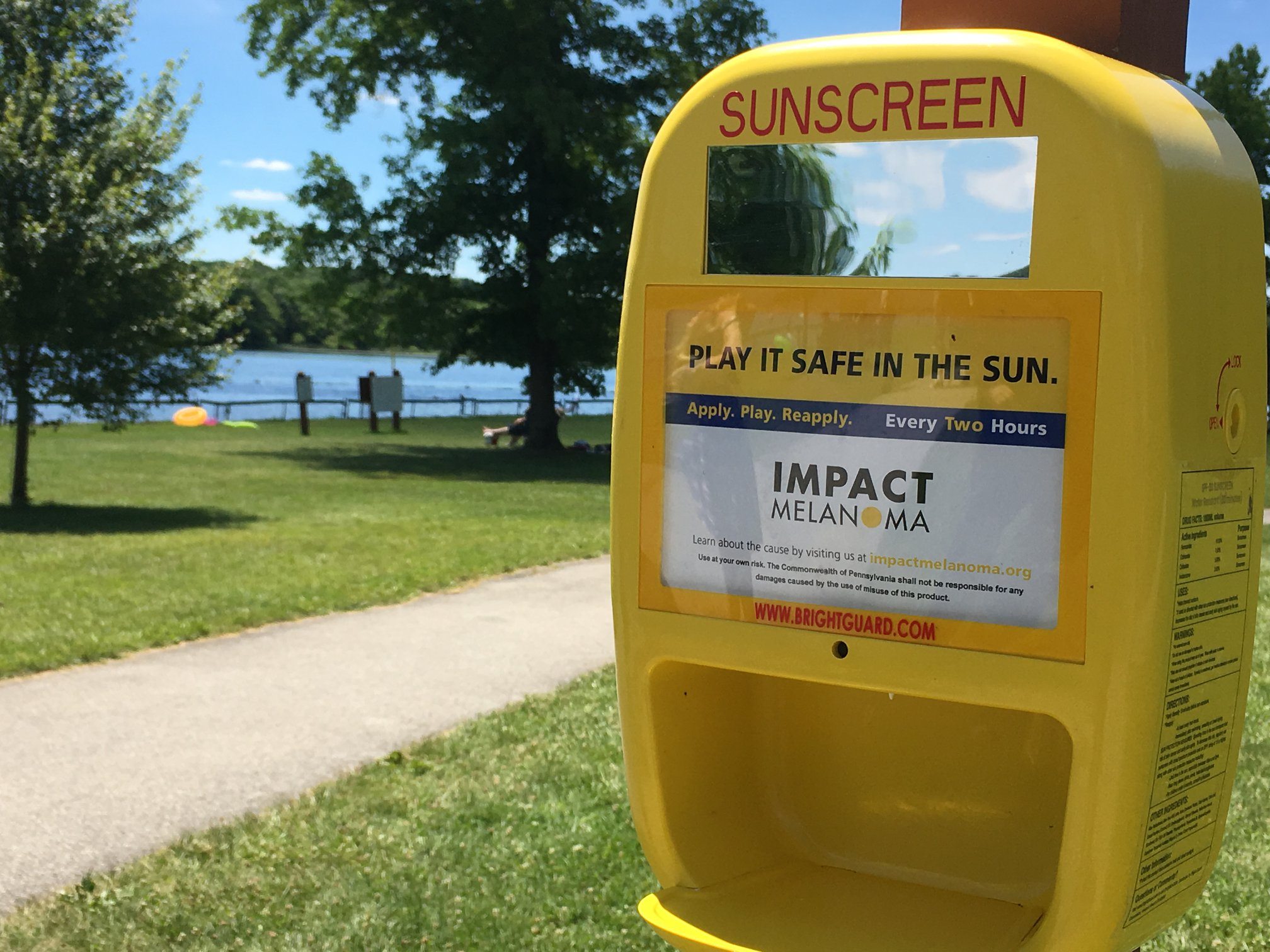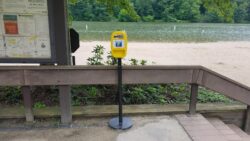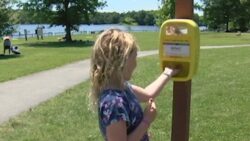The Gradual Successful Expansion of the Pennsylvania State Parks System Sunscreen Dispenser Initiative

2020 marks the 4th year Pennsylvania’s Department of Conservation and Natural Resources, Pennsylvania Department of Health, Division of Cancer Prevention and Control, and IMPACT Melanoma will partner up and distribute sunscreen dispensers throughout an assortment of the state’s parks and recreation destinations. A forged relationship that gets bigger and better with each passing year. Together we’re making a great impact within the state’s borders and have successfully served potential sunscreen utilization to hundreds of thousands of residents and tourists alike.
IMPACT recently engaged in conversation with Pennsylvania Bureau of State Parks Assistant Director, Ryan Dysinger to discuss the ongoing initiative, how it started, and what the future holds for sun safe behavior throughout Pennsylvania’s parks and recreation destinations.
IMPACT Melanoma: We’ve reached four years of work between IMPACT Melanoma, Pennsylvania Department of Health, Division of Cancer Prevention and Control, and the Department of Natural Resources. Exciting, and ever learning! How have things gone up until this point?
Ryan Dysinger: The Pennsylvania Department of Conservation and Natural Resources (DCNR) has always worked to inform and educate outdoor enthusiasts on possible dangers, including water safety, hiking precautions, and illnesses associated with ticks. In 2017, when we began this program, we wanted to shed a light on a very strong light, the sun. The sun is the number one culprit in damaging our skin and causing skin cancer. We want to get the message to our visitors that sunscreen is important to help protect their families. Our expanded program has the potential to reach 800,000 Pennsylvanians. This is an incredibly important initiative that we are excited is reaching more visitors.
IM: What does the rollout look like in 2020 with the current state of things happening around the globe?
RD: We are moving forward with adding four new state parks to the program in 2020. Supplies should be delivered to them soon and installed at their respective waterfront areas once they are fully open and ready for visitors again.
IM: How’d you initially learn about these dispensers and of IMPACT Melanoma?
RD: For the last four years, the Pennsylvania Bureau of State Parks has been working with the Pennsylvania Department of Health, Division of Cancer Prevention and Control to effectively launch a small pilot program to install sunscreen dispensers within select state parks. Two state parks participated in the first year of the fledgling program in 2017, they were Pine Grove Furnace and Codorus state parks. Each park was shipped a kit that includes, two dispensers and pole mounts and six cases of SPF 30+ eco sport sunscreen from IMPACT Melanoma. There is also an educational training session for staff at each location provided by the Department of Health and opportunities to promote on social media. All costs of the products are covered by the Department of Health’s “Cancer Fund,” and we are currently pursuing opportunities to partner with local health organizations and healthcare system providers to cover costs in the future.
IM: What made DCNR/DOH want to get engaged with IMPACT and bring them to your community?
RD: DCNR is an agency charged with among other things, maintaining and preserving state parks and promoting healthful outdoor recreation. The Department of Health is charged among other things, promoting healthy lifestyles and preventing injuries and disease. Therefore this collaboration provides sun safety for our state park visitors, which makes perfect sense. Thus, why we reached out to IMPACT to help us with the cause.
IM: According to my notes you have dispensers in 15-20 sites across the state. Tell us about where they are exactly and who they’re serving. How were these locations chosen?
 RD: We felt we would have the largest impact by focusing on waterfront sites (beaches and pools) as folks naturally have more exposure to the sun while partaking in these activities. After looking at the feedback from Codorus (York) and Pine Grove Furnace (Cumberland) from 2017, the decision was made to expand the program by adding three additional parks in 2018 to this pilot program for a new total of five. The new 2018 parks were Bald Eagle (Centre), Gifford Pinchot (York), and Nockamixon (Bucks). After the 2018 season, the feedback from the five parks participating was positive. Four new parks were added to this program in 2019. Little Buffalo (Perry), Laurel Hill (Somerset), Presque Isle (Erie), and Caledonia (Franklin) are the parks that are participating in the program in 2019. These four specific locations are all within counties that are in the top 8 in the Commonwealth when it comes to late stage Melanoma diagnoses. 2020 saw the addition of five new state parks to the program bringing the statewide total to 14. Beltzville (Carbon), Mt. Pisgah (Bradford), Presque Isle (Erie), Cowans Gap (Fulton), and Marsh Creek (Chester) are the new additions in 2020. Again, these choices were based on Melanoma diagnoses numbers around the state.
RD: We felt we would have the largest impact by focusing on waterfront sites (beaches and pools) as folks naturally have more exposure to the sun while partaking in these activities. After looking at the feedback from Codorus (York) and Pine Grove Furnace (Cumberland) from 2017, the decision was made to expand the program by adding three additional parks in 2018 to this pilot program for a new total of five. The new 2018 parks were Bald Eagle (Centre), Gifford Pinchot (York), and Nockamixon (Bucks). After the 2018 season, the feedback from the five parks participating was positive. Four new parks were added to this program in 2019. Little Buffalo (Perry), Laurel Hill (Somerset), Presque Isle (Erie), and Caledonia (Franklin) are the parks that are participating in the program in 2019. These four specific locations are all within counties that are in the top 8 in the Commonwealth when it comes to late stage Melanoma diagnoses. 2020 saw the addition of five new state parks to the program bringing the statewide total to 14. Beltzville (Carbon), Mt. Pisgah (Bradford), Presque Isle (Erie), Cowans Gap (Fulton), and Marsh Creek (Chester) are the new additions in 2020. Again, these choices were based on Melanoma diagnoses numbers around the state.
IM: Do you have any applicable sponsors you’d like to call out with regards to the sunscreen dispensers?
RD: Currently, we do not. It is a goal to work with local health partners/businesses to potentially sponsor a unit and/or the cost of replenishment supplies in future years. This is something I would like to focus on, as we continue to expand and grow the program.
IM: What, in your estimation is the importance of having these dispensers in place? Feel free to share any personal experiences with combating the suns UV rays, etc.
RD: We are extremely grateful that the Department of Health and its Division of Cancer Prevention and Control have partnered with us to support and expand this important project. In promoting outdoor activity, we’re aware over 8,500 Americans are diagnosed with skin cancer each day, and these dispensers should prove invaluable to visitors to our lakes, beaches, and pools who may overlook sunscreen when packing for a day’s outing.
If you’re like most parents, it’s hard to stay on top of sunscreen application during the summer months, even though you know it’s important. It’s so easy to forget the lotion at home or fail to lather up your kid before he goes into the water to cool off. Then, more than likely your child has a sunburn and was exposed to the harmful UV rays that we know can damage their skin.
Despite the increasing awareness of the dangers of sun exposure and indoor tanning, more than one-third of Americans will get at least one sunburn this year. One in 40 Pennsylvanians will be diagnosed with Melanoma in their lifetime. Skin cancer and Melanoma are among the most prevalent and the most preventable types of cancer.
As I visited several amusement parks, public swimming pools and Major League Baseball stadiums with my family, I noticed a growing trend helping to combat the dangers of sun damage. These facilities provided their guests with FREE sunscreen. I also make an annual visit to see my dermatologist, for a skin check, as I can remember not always practicing the best sun protection tips when I was younger. The combination of these experiences led me to look into a program for our state parks.
IM: How have people responded to / engaged with the dispenser units? What’s feedback been like?
 RD: Feedback has been largely positive. They like the idea of this service available to them should they happen to not pack their sunscreen with them. I also think the bright yellow units that stick out in a natural environment, help act as a reminder to people to take sun protection seriously.
RD: Feedback has been largely positive. They like the idea of this service available to them should they happen to not pack their sunscreen with them. I also think the bright yellow units that stick out in a natural environment, help act as a reminder to people to take sun protection seriously.
IM: What sort of IMPACT does this project leave on your community and what are next steps in assuring that they are properly utilized and taken advantage of?
RD: We want people to get outside and enjoy the wonderful swimming areas that Pennsylvania state parks offer, all while practicing safe habits. The free sunscreen offered at state parks allows park visitors to protect themselves from harmful ultraviolet radiation. Sunscreen with SPF 30, or higher, with broad spectrum coverage can help protect the skin from dangerous sunburns and decrease the chances of developing serious health conditions.
IM: What’s your battle cry sound like with regard to getting surrounding communities in your area, and across the globe, to adopt a similar proactive approach to helping combat skin cancer with these dispensing devices?
RD: Our first goal is to continue to expand this across our Pennsylvania State Parks system. At 121 state parks, we still have a way to go. That being said, it would be great for other state parks systems across our country to look at doing something similar. In Pennsylvania, there are plenty of county park and municipal park systems where this would have a positive reach as well.
IM: What does it mean to you that this type of organization (IMPACT) exists?
RD: I think it is great. From the informational resources that are available to the ability for us to procure the sunscreen dispensers and supplies to provide this service to our visitors, we couldn’t have done this without IMPACT.
IM: Feel free to add anything I may not have addressed that you would like to get across.
RD: This partnership was pursued since over 8,500 Americans are diagnosed with skin cancer each day, making it the most common type of cancer in the United States, according to the American Academy of Dermatology. The ADA states that rates of melanoma, the most fatal form of skin cancer, have doubled since 1982. Experts say that daily application of a sunscreen with a Sun Protection Factor (SPF) of 30 or higher can prevent the contraction of skin cancer; a 2010 study found it cuts the risk in half. Each dispenser contains 1,000 squirts worth of a zinc-based sunblock with broad-spectrum, SPF 30 protection.
Get involved: To bring IMPACT Melanoma’s award winning programs (which include our ever popular sunscreen dispensers) to your state, town, or community, contact IMPACT Melanoma today and let’s discuss how we can help best serve your unique needs.

